
Should You Use a Free Open Source CRM? [Pros & Cons]
 Updated on
Updated on
 By Bradley Kovacs
By Bradley Kovacs
Bradley Kovacs
Bradley has been passionate about technology since childhood, starting with Microsoft Flight Simulator at age six. In college, he automated his data e...
learn more
Bradley Kovacs
Bradley has been passionate about technology since childhood, starting with Microsoft Flight Simulator at age six. In college, he automated his data e...
Table of Contents
Table of Contents
It's common knowledge that business is better with a CRM. Their capabilities, which include incredible organization and automation, among other things, aid in smoothing business processes, particularly in sales and marketing. They can help you through every stage of the sales cycle or with distributing marketing material.
You must know that, though. It's why you're here.
But if you don't, and it's not, CRM stands for customer relationship management. As that name suggests, it's software that can help businesses manage their relationships with their customers. Typically they have features like email automation, task automation, customer organization, customer data, lead generation, etc. These platforms make the customer-facing work at your business much easier.
Unfortunately, CRMs can come at quite a hefty cost. And, if you're a small business, a business struggling or trying to be mindful or tighten its budgets, this can be a limiting factor.
So you're looking at free CRM app options and want to know if you should use a free open source CRM. And we're here to help you answer that question.
In this post, we'll go through a free open source CRM, its pros and cons, and what a self-hosted one is.
What is a Free Open Source CRM Software

Free open source CRM software is CRM software that allows users to access the code to create a more customized experience.
This means that on top of the features the base CRM offers, you can tweak/build them so they're tailored to your business's specific needs. All you need is coding knowledge or an employee with coding knowledge.
The free aspect means you can download and use this CRM software at no cost. So basically, you get a free CRM with only your business's abilities at coding, limiting what it can do.
Because of the free aspect, there are likely to be some limitations on the CRM (although not necessarily in terms of what it can do). For instance, it may have poor customer support or limited security. If it's self-hosted, you'll be in charge of all the maintenance required to keep your CRM updated and running.
What's that? What's a free self-hosted CRM?
Let's get into it.
What is Free Self Hosted CRM
A self-hosted CRM is hosted by the business itself rather than on the CRM's server online. You're responsible for managing and maintaining a self-hosted CRM without much interference from the CRM's company.
With self-hosted CRMs, you'll also download the software onto your device, rather than having it hosted on the internet like with a cloud-based CRM. This lends itself well to an open source CRM because you can manipulate the code as you please and build your CRM from the ground up with what you need it to do.
Open Source CRM Comparison Table
Here's a quick snapshot before diving into the reviews. Think of this as your "menu preview" before ordering the full dish:
|
CRM Tool |
Best For |
Key Features/Highlights |
|
All-in-one ERP + CRM suite |
POS, invoicing, timesheet, eCommerce, annual updates, reports |
|
|
Large community, hybrid options |
Cloud + open source, mobile app, workflow management |
|
|
Robust, community-driven CRM |
Vtiger fork, strong dev community, CLA + pull requests |
|
|
Widely adopted with strong integrations |
1M+ downloads, integrations (Outlook, DocuSign, Facebook) |
|
|
SMBs managing products + projects |
Full ERP suite, built-in CRM, accounting, inventory, HR |
|
|
Multi-purpose for SMBs |
CRM + invoicing + HR, modular apps, strong open source community |
|
|
Sales + marketing automation focus |
Workflow automation, sales funnel, marketing triggers |
|
|
Flexible and scalable CRM/ERP |
Modular, Dockerized, Salesforce-like UI |
|
|
Tine 2.0 |
EU-based organizations (GDPR-friendly) |
Groupware + CRM, calendar, email integration |
|
Joomla-based websites/small businesses |
Add-ons like JoomCRM, Joomla! CRM; self-hosted PHP solutions |
10 Best Free Open Source CRM Tools (Reviewed)
There are various free open source CRM tools available, with different advantages and disadvantages. Different tools will suit different businesses better, so it's important to do your research before deciding on which you get.
Lucky for you, we've kickstarted your research with a list of free open-source CRMs.
Below we've outlined (in no particular order) 10 open source CRM tools, which we've chosen based on ratings from g2 and Capterra.
1. Odoo CRM
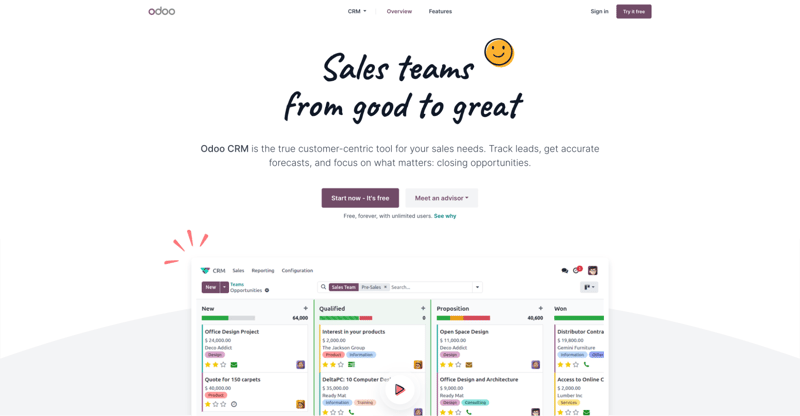
First up, we have Odoo CRM. This free open source CRM is an all-in-one solution with several different applications and integrations you can combine to create a solution beyond just a CRM. For instance, it can include
- POS
- Sales
- Timesheet
- MRP
- Purchase
- eCommerce
- Invoicing
… Just to name a few.
This app also includes annual releases and in-app reports, so you can always be at the top of your sales performance.
According to reviews on g2, customers like having access to everything in one place and find Odoo easy to use. However, some found that support was lacking, and others seem to have found some aspects (like database use) confusing or time-consuming.
- Paid Version Available: Yes. Odoo also has a paid hosted version and add-on applications available for a price.
2. Vtiger CRM
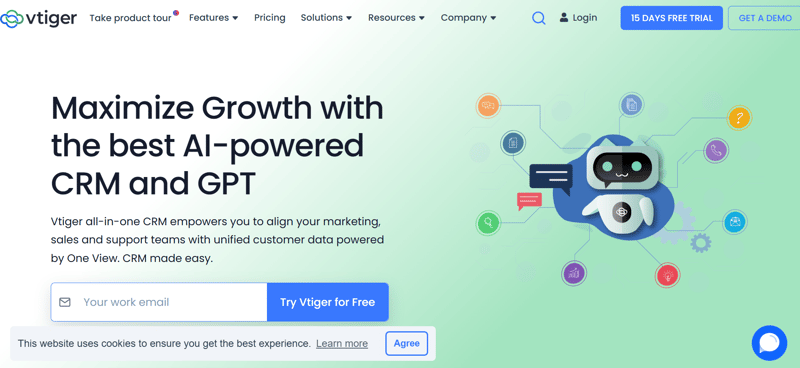
Next up we have Vtiger. This software's open source plan is very popular, with over five million downloads and thousands of developers, making it have a very large community.
However, according to its admission, its open-source CRM is not its cheapest, despite being free to download. With other potential costs, like hosting and upgrading, Vtiger says its open source CRM can be even more expensive than its cloud-based one. And Vtiger does offer a free cloud-based CRM, too.
So, although Vtiger does offer a free and open source CRM, it does suffer from some limitations.
The reviews on g2 may reflect this, with some inconsistency. However, in general, customers think the mobile app requires work, and the app itself is fairly easy to use.
- Paid Version Available: Yes, in both open source and cloud-based plans.
3. YetiForce CRM
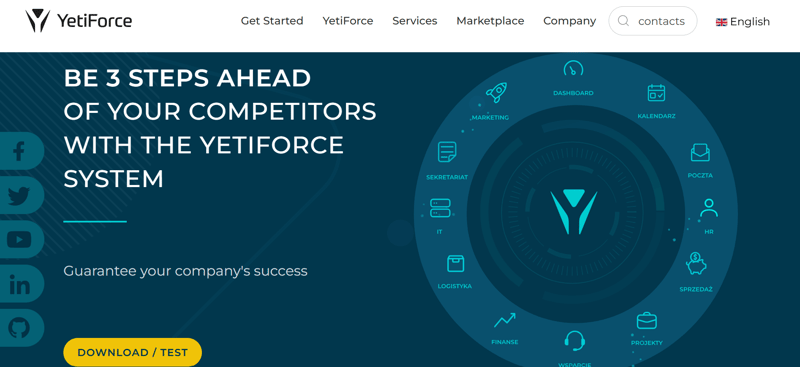
And now, YetiForce! This Polish CRM was originally developed from Vtiger but has become its own thing. It brags a robust support team on its website, with its team of developers and its community. (However, support is limited in its free version.) On its website, you can report issues, download a CLA (Contributor License Agreement, signed so you can submit a patch), send a pull request, etc.
According to reviews on g2, some customers have found the CRM has a comprehensive and fairly complete set of features and integrations to use, especially for its (potentially free) price. But, some have found that the documentation and reporting have been lacking.
- Paid Version Available: Yes. YetiForce offers three paid packages on its website. Hosting + Support, Cloud + Support, and 5H Package are those packages.
4. SuiteCRM
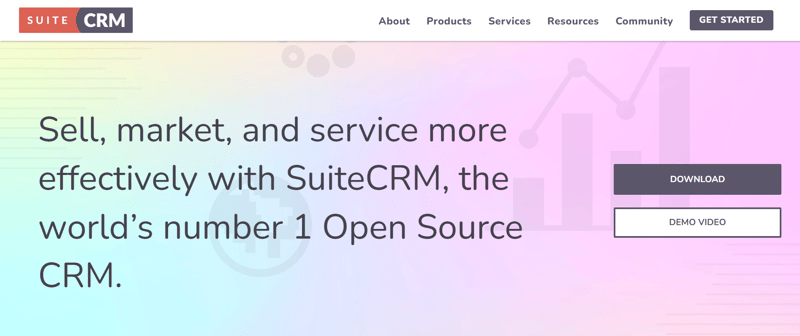
Lastly, to round out our list, we've got SuiteCRM. With over one million downloads and over 120,000 community members, this free open source CRM is undeniably popular with a bustling community to help your business out with any issues. This application also has the opportunity for many potential integrations, like with DocuSign, Outlook, and Facebook.
According to reviews on g2, some customers seem to be impressed with the numerous capabilities of this CRM. Still, some also find it challenging or tedious to use, potentially requiring a certain amount of expertise to use (PHP (a scripting language) experts were mentioned).
Paid Version Available: Yes, SuiteCRM does have paid versions available.
5. ERPNext (CRM Module)
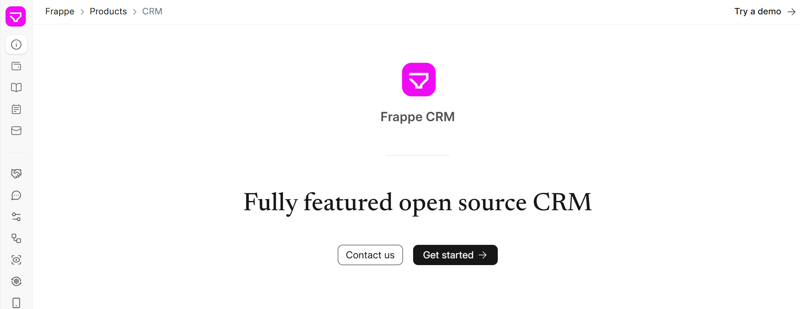
ERPNext is like the Swiss Army knife of open source software. Built as a full ERP suite, its CRM module is seamlessly integrated with accounting, HR, inventory, and project management. That means you don't just track leads, but also your entire business under one roof.
On the plus side, small to midsize businesses love that it helps manage sales while also keeping an eye on product pipelines and employee tasks. According to user feedback, ERPNext is intuitive for an ERP (which is saying something), but can get heavy if you only want CRM features.
- Paid Version Available: Yes, ERPNext offers managed hosting and support services if you'd rather not handle self-hosting.
6. Dolibarr
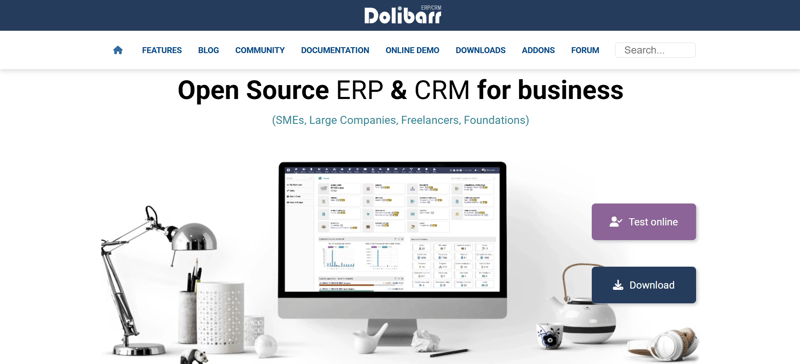
Dolibarr is another versatile free open source CRM software that bundles CRM with invoicing, HR, project management, and even stock management. Essentially, it's a digital toolbox for SMBs that like to keep things simple and consolidated.
Its community is pretty active, with plenty of modules and extensions available. Reviews suggest it's straightforward to set up, though some say the UI could use a facelift compared to shinier SaaS competitors. Still, for a self-hosted CRM that's free, Dolibarr punches well above its weight.
- Paid Version Available: Yes, paid services and premium add-ons are offered for those who want advanced features.
7. X2CRM
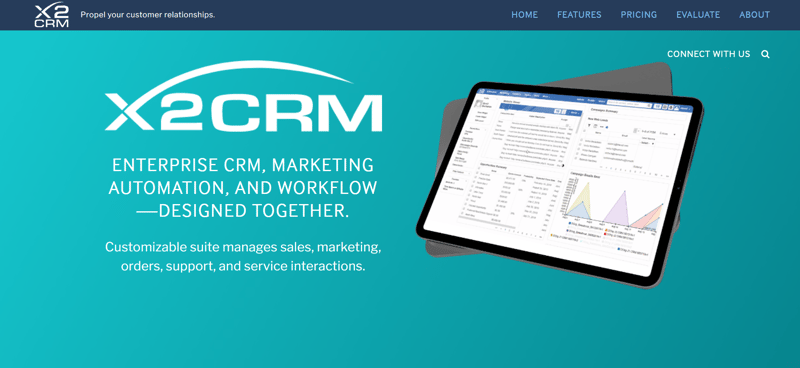
If workflow automation and sales funnels are your jam, X2CRM might be your new best friend. This open source sales tracking software was designed with marketing triggers, lead scoring, and customer journey tracking baked in.
Users often highlight its automation features as a standout, which include drip campaigns, rule-based triggers, and visual pipelines. On the flip side, the learning curve can feel steep for non-technical users, but once you set it up, it runs like clockwork.
- Paid Version Available: Yes, commercial editions and professional support are available.
8. Crust CRM
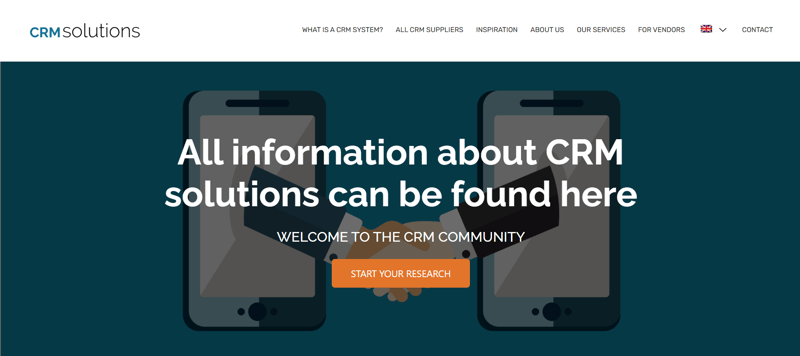
Crust CRM markets itself as a Dockerized, modular alternative to Salesforce, and it delivers. It's not just a CRM, it's an open-source platform that can flex into ERP, identity management, and team collaboration. The design leans heavily into a familiar Salesforce-like UI, making adoption smoother if you've dabbled in the big SaaS players.
Scalability is Crust's main strength. It's built for businesses that want more than a simple free self-hosted CRM. It's for those eyeing long-term growth without handing everything over to a proprietary vendor.
- Paid Version Available: Yes, hosted and enterprise services exist for larger teams.
9. Tine 2.0
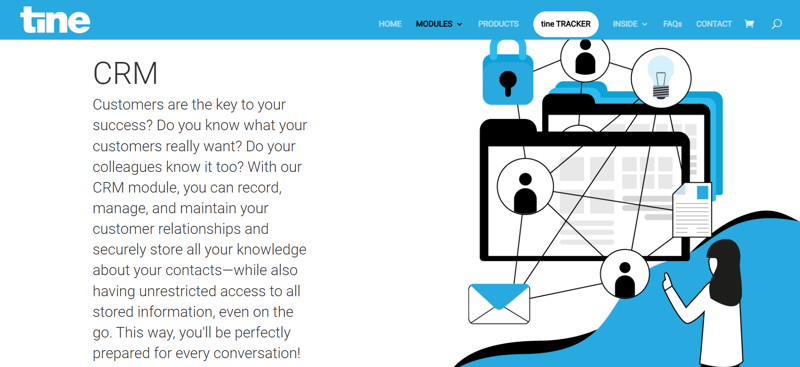
Straight out of Germany, Tine 2.0 combines groupware and CRM into one GDPR-compliant package. Think of it as Outlook, Google Calendar, and a CRM having a productive European baby. It includes features like calendar syncing, email integration, and contact management, all wrapped in strict EU data-protection standards.
Reviews note that it's especially well-suited for organizations operating under GDPR requirements. However, some users say it feels more like groupware first, CRM second.
- Paid Version Available: Yes, professional hosting and enterprise packages are available.
10. Free Joomla CRM Extensions
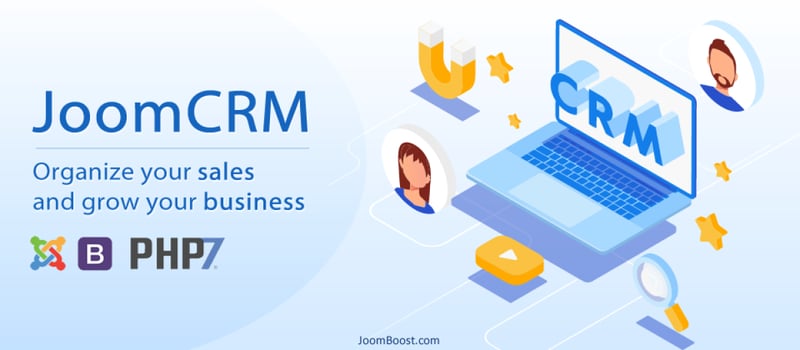
If your website runs on Joomla and you've been hunting for a free Joomla CRM, good news: you don't need to rebuild everything from scratch. Extensions like JoomCRM and Joomla! CRM plug right into your existing site, giving you basic CRM functionality without switching platforms.
These extensions are best for small businesses that already live inside Joomla and want to tack on CRM without breaking the bank. The downside? Features aren't as expansive as the big guns like Odoo or SuiteCRM, but they do the trick for lead capture, contact management, and lightweight sales tracking.
- Paid Version Available: Yes, many Joomla CRM extensions have premium upgrades for advanced features.
To Sum Up

There are a variety of free open source CRMs on the market, and some of them can be great CRM tools. Four examples of great free and open source CRMs include
- Odoo CRM
- VTiger CRM
- Yetiforce CRM
- SuiteCRM
Depending on your business, a free open source CRM can be an effective tool. They're cost-effective, customizable, and often have wonderful communities attached to them. But, there are downsides, too. They're harder to use, may have security risks, need to be maintained by your business, and could have less customer support. So, there are other types of CRMs, too, that you may wish to consider.
Like Ringy, for instance. You can watch our free demo to see how it works or email us with any questions you might have about our software and what we can do for you.

Skyrocket your sales with the CRM that does it all.
Calling? Check. SMS? Check. Automation and AI? Check. Effortlessly keep in touch with your customers and boost your revenue without limits.

Take your sales to new heights with Ringy.
Sales in a slump? Ringy gives you the tools and flexibility you need to capture leads, engage with them, and turn them into customers.
Subscribe to Our Blog
Enter your email to get the latest updates sent straight to your inbox!
Categories
Related Articles




































































































